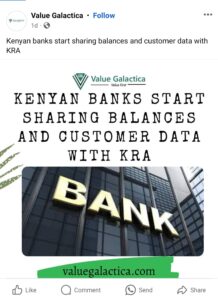A claim circulating on social media that Kenyan banks have started sharing balances and customer data with KRA is misleading. The post was shared on a Facebook page called Value Galactica. 
In order to establish the veracity of this claim, Mashinani check has delved deeper into it.
The Common Reporting Standard (CRS) was developed by the Organization for Economic Cooperation and Development in 2014 as a global standard to automatically exchange financial account information on tax matters as a way of fighting against tax evasion .
The finance act 2021 introduced the CRS through introduction of section 6B to the tax procedures act. The act states that;
(1) A reporting financial institution shall identify reportable accounts as specified by the common reporting standard Regulations prescribed under subsection (6) and file with the Commissioner —
(a) an information return on reportable accounts held, managed or
administered by that reporting financial institution; or
(b) a return marked “nil” if no account held, managed or administered by that reporting financial institution is identified as a reportable account.
A review of Diamond Trust Bank’s (DTB Kenya) website to understand the overview of the Common Reporting Standard had also established the following facts about the claim:
- Banks have started implementing the Common Reporting Standard as required by the law under the tax procedures Act 2023.
- The CRS aims at determining a customer’s tax residency/ where they are liable to pay taxes, in order to identify customers who are tax residents outside the nation where their accounts are maintained.
- For a tax resident outside Kenya, the bank may give your tax resident information to KRA, which may then share this information with the tax authority where you are a tax resident.
- The bank will give account details and products including account balance or value, total amount of interest or payment credited.
- The bank will establish tax residency of all its customers however, for a tax resident in the same country where the account is held, the details will not be shared to KRA for CRS purposes.
A review of Kenyan tax residency has revealed that to be considered as a tax resident in kenya one needs to have a permanent home in Kenya and was present in Kenya for any period in a particular year of income under consideration or was present in Kenya for periods amounting to 183 days or more in that particular year of income or was present in Kenya in that year of income and in each of the two preceding years of income for periods averaging more than 122 days in each year of income.
For entities to be considered tax resident;
(1)the body is a company incorporated under the Kenyan law
(ii) the management and control of affairs of the body was exercised in Kenya in a particular year of income under consideration or
(ii)the body has been declared by the minister by notice in the gazette notice to be resident in Kenya for any year or income.
A post by Citizen Digital has also revealed that the Kenya Bankers Association while responding to citizen TV said that KRA had requested data on account stakeholders,residence,jurisdiction,address, tax identification number as well as date and place of birth.
Contrary to the claim that Kenyans banks have started sharing balances and customers data with KRA, the banks will only share data of customers who are tax residents outside Kenya/ hold offshore accounts. Mashinani check has looked into the claim and found it to be misleading.
This fact check was completed by Oumah Phenice


